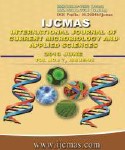


 National Academy of Agricultural Sciences (NAAS)
National Academy of Agricultural Sciences (NAAS)

|
PRINT ISSN : 2319-7692
Online ISSN : 2319-7706 Issues : 12 per year Publisher : Excellent Publishers Email : editorijcmas@gmail.com / submit@ijcmas.com Editor-in-chief: Dr.M.Prakash Index Copernicus ICV 2018: 95.39 NAAS RATING 2020: 5.38 |
India spent Rs. 2,96,431 Crore to import 143.813 MMT of crude oil during April-November, 2016 showing a marked increase of 9.31% in quantity terms and 4.84% decrease in value terms over the same period of last year. Interspecific hybridization as prebreeding approach has been proved as an important approach to widen variability and potential plants emerged as derivatives have been effectively utilized in genetic improvement of Jatropha. The genetic approach proved applicable for utilizing nontoxic source applying conventional breeding and HPLC analysis of Phorbol 12-Myristate 13-Acetate (PMA) to develop nontoxic, high oil yielding lines of Jatropha. Analysis of plants comprising selected crosses involving Non-toxic lines, old crosses and backcrosses with and without non-toxic parents in early and late flowering, advanced line(s) and its clones on quantitative and qualitative traits viz. oil content and estimate PMA equivalent in seeds. PMA analysis by HPLC in seeds over the study material helped in identification of plants in crosses with low or no PMA and non-toxic (NT) plants from provenances. The detail analysis of PMA in seeds and its part precisely contributed in establishing the genetic basis (Maternal inheritance) and also hypothesizing involvement of more than one dominant genes controlling PMA content in Jatropha.
 |
 |
 |
 |
 |